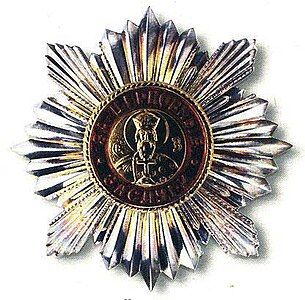
Order of Saint Vladimir

| Imperial Order of Saint Prince Vladimir | |
|---|---|
 Star of the Order | |
| Awarded by the Emperor of All Russia | |
| Type | Dynastic Order |
| Established | 3 October 1782 |
| Country | Russian Empire |
| Royal house | House of Romanov |
| Religious affiliation | Russian Orthodox Church |
| Motto | "Benefit, Honour and Glory" |
| Status | No longer awarded |
| Grades | 1st, 2nd, 3rd, and 4th classes |
| Precedence | |
| Next (higher) | Order of Saint George |
| Next (lower) | Order of Saint Anna |
Ribbon of the order | |
The Imperial Order of Saint Prince Vladimir (Russian: орден Святого Владимира) was an Imperial Russian order established on 3 October [O.S. 22 September] 1782 by Empress Catherine II in memory of the deeds of Saint Vladimir, the Grand Prince and the Baptizer of the Kievan Rus'.

Grades
The order had four degrees and was awarded for continuous civil and military service. People who had been awarded with the St. Vladimir Order for military merits bore it with a special fold on the ribbon – "with a bow". There was a certain hierarchy of Russian Orders. According to this, the First Class Order of Saint Vladimir was the second one—the first was the Saint George Order—by its significance.

According to Russian laws on nobility, people who were awarded the Order of Saint Vladimir had the rights of hereditary nobility until the Emperor's decree of 1900 was issued. After this, only three first classes of the order gave such a right, the last one granting only personal nobility.

Today, Grand Duchess Maria Vladimirovna, claimant to the Headship of the Russian Imperial House, continues to award the Russian Imperial Order of Saint Vladimir as a dynastic order of knighthood.[1] The validity of her awards is disputed by some historians and by some members of the Romanov Family Association. [2]

Styles

- First class
- A red cross with black and golden borders; the badge of the order depended from a sash worn over the right shoulder, and a gold-and-silver eight-rayed star was fastened over the left chest
- Second class
- The red cross on the neck and the star over the left chest
- Third class
- The red cross of a smaller size on the neck
- Fourth class
- The red cross over the left chest
Insignia

A red enamelled cross pattée with black enamelled borders, and a black enamelled central disc bearing a crowned red and ermine mantle with the monogram of Saint Vladimir. Worn on a sash by the first degree, on a necklet by the second and third degrees, and on a chest ribbon by the fourth degree.

A four-pointed star superimposed upon a four-pointed gold star, with a golden cross pattée and the letters "CPKB" between the arms of the cross on a black enamel background at the centre surrounded by the motto of the order "Benefit, Honour and Glory".

Worn on the left chest by the first and second degrees. This motto was transferred to present-day star of the Order of Merit for the Fatherland, which was established in 1992 by President Boris Yeltsin and is today the second highest ranking decoration of that country.

Order of Saint Vladimir of the Russian Orthodox Church
In 1957, in commemoration of the 40th anniversary of the Patriarch of Moscow's restoration in Russia, an Order of Saint Vladimir was created by the Russian Orthodox Church. The order is to be awarded to priests and nuns of the Orthodox church for their service to the Soviet Union and later Russia.

There are three degrees of the order.[3] It has no relation to the imperial order.[4]

-
Orthodox Order of Saint Vladimir, 1st degree
-
Order of Saint Vladimir, 2nd degree
-
Order of Saint Vladimir, 3rd degree
Select recipients
- Tudor Vladimirescu
- Abbasgulu Bakikhanov
- Alexander Kolchak
- Alexander Pietrov
- Angus Buchanan
- Anto Gvozdenović
- August Ludwig von Schlözer
- Charles Broke Vere
- Charles Esmond de Wolff
- Dimitrije Milaković
- Fyodor Matisen
- Gavriil Alekseevich Korsak-Koulagenkov [5]
- Hugo W. Koehler
- Igor Sikorsky
- Ilya Ulyanov
- Ivan Gannibal
- Jacob van Deventer
- Jovan Sundečić
- Louis-Mathieu Langlès
- Mikhail Tukhachevsky
- Mitrofan Lodyzhensky
- Nikolai Yudenich
- Nićifor Dučić
- Pyotr Ilyich Tchaikovsky
- Paulos Gregorios
- Milan Rastislav Štefánik
- Pyotr Stolypin
- Robert Henry Dick
- William Munro Kerr
- Hugh Henry Mitchell
- Petar Bojović
- Tchaikovsky
- Đorđe Petrović
- Karl Nesselrode
- Pyotr Poletika
- Asad-bey Talyshkhanov
- Antun Mažuranić
- Viktor Petrovich Skarzhinsky
- Vsevolod Ivanovich Roborovsky[6]
See also
References
- ^ "Императорский Орден Святого Равноапостольного Великого Князя Владимира". Russian Imperial House. Retrieved 25 March 2014.
- ^ Sainty, G. S. (2006). World orders of knighthood and merit. Wilmington: Burke's Peerage. ISBN 9780971196674.
- ^ "Орден святого равноапостольного великого князя Владимира" (in Russian). Eparchy of Kazan. Retrieved 29 November 2012.
- ^ "Russian Heraldry as It is /". The.heraldry.ru. 14 November 2006. Retrieved 29 November 2012.
- ^ Diploma #1498 dated December 3, 1887 on behalf of Emperor Aleksander III Fond 1343,Heraldry Department, inventory 23, file 7217 Korsak-Koulagenko Family
- ^ "Предводитель дворянства Скаржинский Александр Матвеевич и отдельные представители его рода".
See what we do next...
OR
By submitting your email or phone number, you're giving mschf permission to send you email and/or recurring marketing texts. Data rates may apply. Text stop to cancel, help for help.
Success: You're subscribed now !



